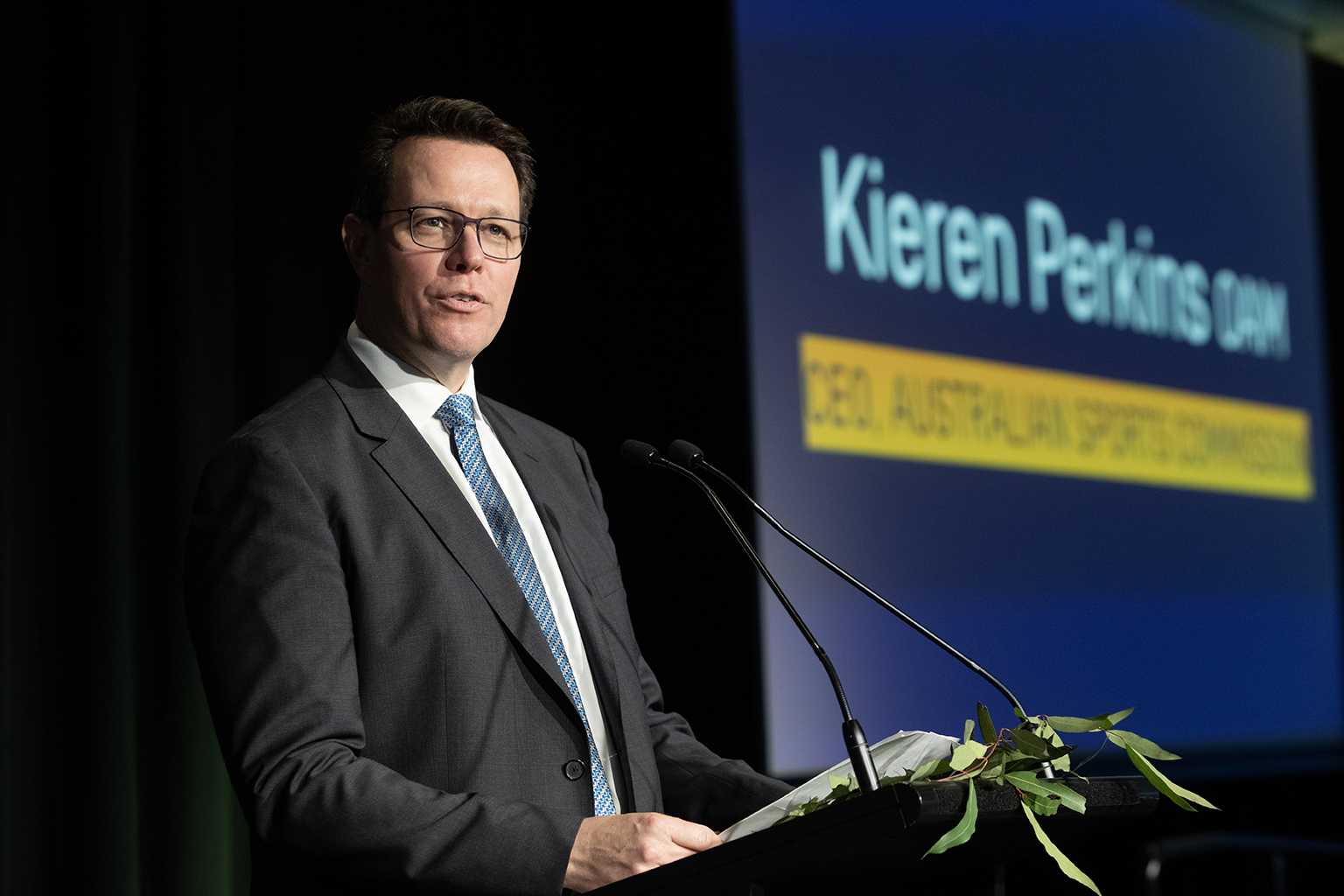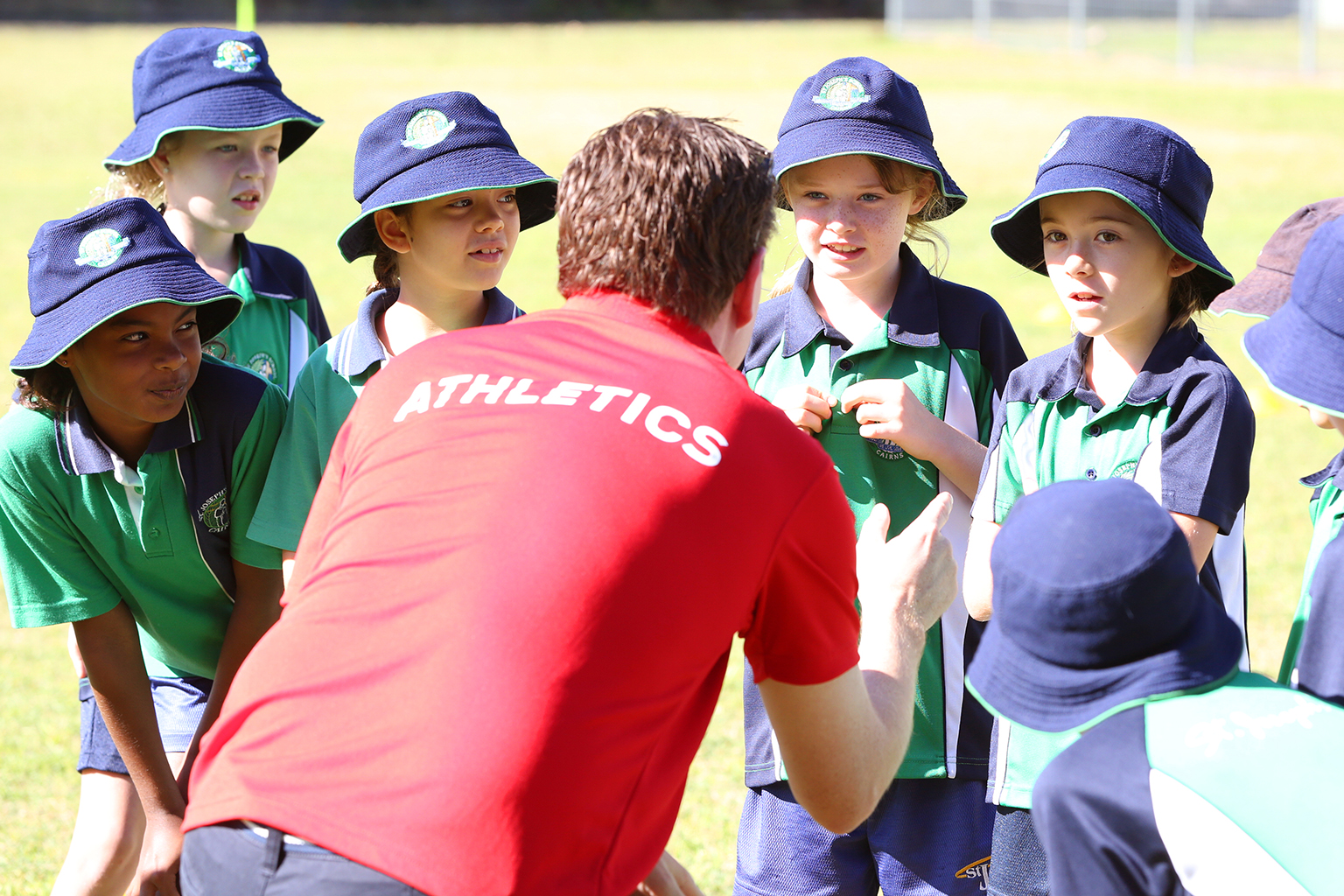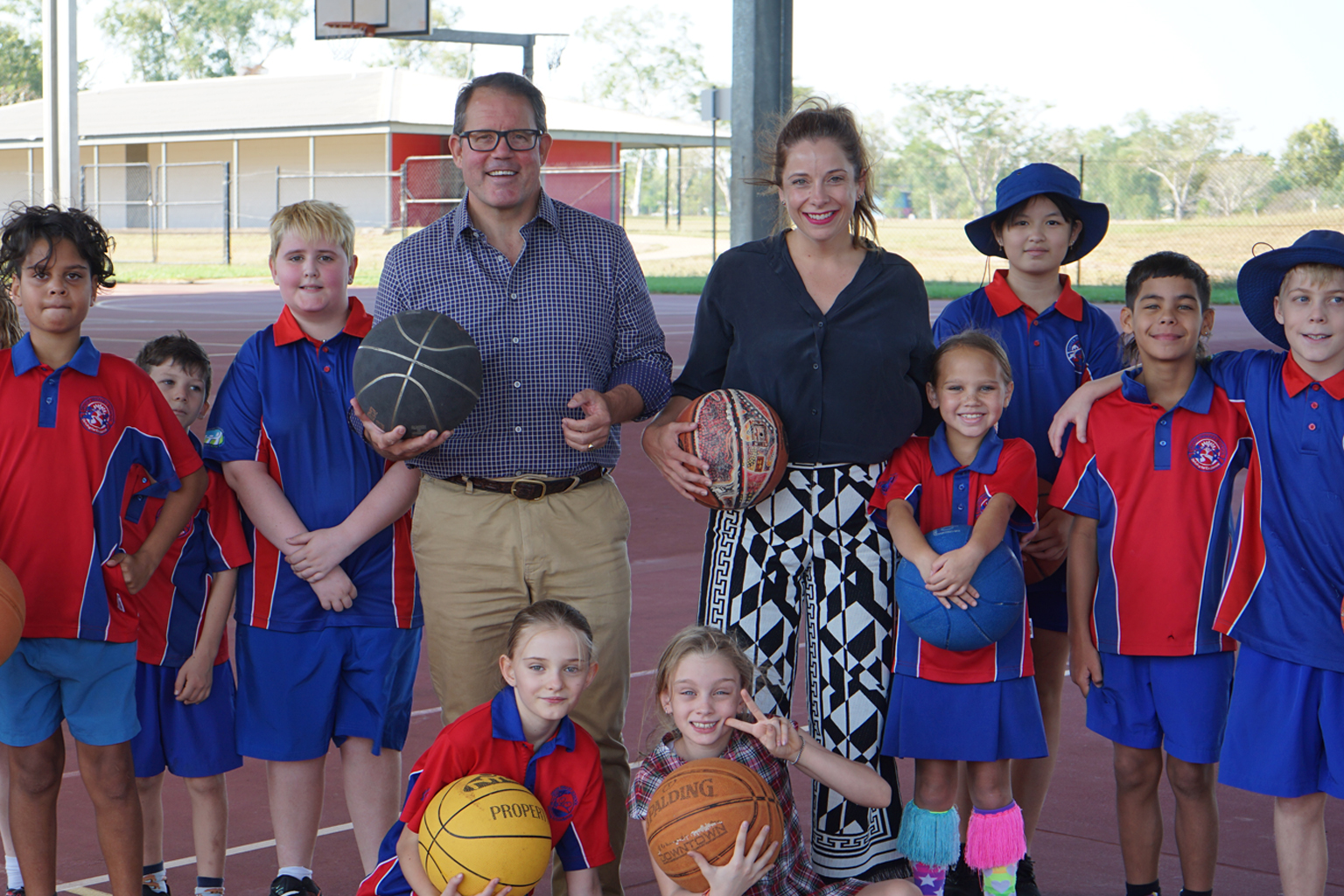31 August 2023
Australian Sports Commission (ASC) CEO Kieren Perkins OAM has addressed education leaders and teachers at EduTECH, one of Australia’s biggest tech education events. During the presentation he launched the ASC’s new PE - Essential skills for primary teachers course, a free online resource designed to support teachers to build the skills and confidence to deliver purposeful and engaging physical education.

I wish to acknowledge the Traditional Owners of the land on which we meet today, the Wurundjeri People of the Kulin Nation, and to pay my respects to their Elders past and present.
I wish to also recognise the outstanding contribution that Aboriginal and Torres Strait Islander people make to society and sport in Australia and to celebrate the power of sport to promote reconciliation and reduce inequality.
Good morning and thank you for the invitation to speak at EduTech.
I’m excited to be here today to launch our new online PE - Essential skills for primary teachers course – I couldn’t think of a better occasion, but more on that later.
As I stand here today, I naturally think back to my own school days. And the fact I had my very first swimming lesson at Indooroopilly State Primary School.
I wasn’t very good at first, I just loved having a go at anything: football, Aussie rules, tennis, gymnastics, cross country running- you name it, I tried it. For a long time, it wasn’t about results- but fun and enjoyment.
As my career went on, I chased gold medals.
And that’s what I’m still doing today as CEO of the Australian Sports Commission.
I’m chasing gold medal standards across the entire sports industry from grassroots to the pinnacle of elite competition.
The Australian Sports Commission works with the sport sector, other government partners, businesses, and the wider community to champion the role sport can play in engaging every Australian regardless of age, race, gender, cultural background, or physical ability.
We oversee the vast sporting ecosystem – players, coaches, officials, administrators and volunteers – to ensure they reflect the diversity of Australian communities.
Our goal at the ASC is to make sport in Australia the world’s best.
That is an ambitious, but worthy goal, that doesn't start in the sport science facilities at the Australian Institute of Sport- it starts in your playgrounds.
You see, when we witness greatness – like the Matildas’ phenomenal performance at the World Cup, youngsters are inspired to participate.
Green and Gold success on the world stage is important to our national psyche. But without a massive base of participants involved in fun, engaging activities, developing skills and a love of sport, it all falls apart.
Which is where you- our teachers and schools- come in.
Leading into the Olympic and Paralympic Games in Brisbane in 2032, we are underway in a "Green and Gold decade of opportunity” to bring schools and sports together to help Aussie children get active.
Physical education plays an integral part in any school. Sport carries great meaning not just because of its virtues, but because through sport we learn and grow.
Co-operation is central to nearly every human pursuit, and sport provides a basis for children to experience playing together, often building new friendships.
Teamwork is central to sport, with many children taking on leadership roles for the first time. Students have to find a way to work with their peers towards a common goal.
The sporting experience, whether kids excel in that environment or not, reveals character. It allows students to experience triumphs and failures. It shows them the power of perseverance. It illustrates progress through hard work.
In an increasingly disconnected world, sporting experiences build community. A sense of identity in the face of a collective challenge.

My own relationship with sport has shaped my post-swimming career to a great extent. It was sport that first showed me the very tangible link between training and skill-development, drills and execution, hard work and improvement. These are the very skills I applied to my own study and progression outside the pool.
Now, these are just my own experiences and opinions- of course I value sport and believe it has enormous benefits. But like any athlete, I also trust the data.
I’d like to share the latest research and trends which illustrate the true value of sport in education.
Firstly, a love for physical activity and sport participation begins during primary school.
Evidence shows us that playing sport during childhood is critical for developing a life-long habit of being physically active. Children who grow up playing sport are more likely to remain active as adults.
The current trends in physical activity among children are alarming.
Two in three children don't meet Australia's physical activity guidelines, and one in four children are overweight or obese, impacting their long-term health outcomes.
Among girls as young as 7, we are witnessing less enjoyment and less positive attitudes towards physical activity and sport. They also feel less competent and confident in their ability to take part. As girls mature these attitudes and experiences appear to become more entrenched.
Children who participate in sports also spend less time playing electronic or computer games and are less likely to be sedentary overall.
By building a love for physical activity at an early age, the long-term physical, mental and social benefits are significant.
Children who have all five elements of Physical Literacy are more active and report higher levels of happiness, greater trust in others, and enhanced. These elements are:
- Enjoyment
- Confidence
- Competence
- Understanding
- Knowledge
The second thing we know from our research is the critical role teachers and schools play in modelling behaviours and creating accessible sporting environments.
The ASC leads the largest and most comprehensive annual survey of sporting participation in Australia called AusPlay. The latest AusPlay data tells us that low-income households have the lowest participation levels for both adults and children.
At the moment, participation rates generally continue to rise in line with income. As a country, we can’t afford to have sport only attainable to the wealthy.
So as sporting clubs become more expensive, engagement with a variety of sporting options in the schoolyard becomes even more critical.
There are proven links between PE classes improving cognitive skills, social skills, attentiveness and academic behaviours – ultimately driving better academic results.
ASC CEO Kieren Perkins
Children are also less likely to participate in organised sport outside-of-school hours if they live in a remote or regional area, have a parent who speaks a language other than English at home, or if they have 3 or more siblings.
Schools may be these students’ best and only shot at participating in physical activity. And teachers play a key part in modelling active lifestyles and active play.
Thirdly, active students and schools reap numerous additional benefits: improved academic achievement, enhanced mental well-being, and increased community engagement.
Children who achieve 45 minutes a day of moderate-to-vigorous physical activity perform better in writing, numeracy, and overall proficiency.
There are proven links between PE classes improving cognitive skills, social skills, attentiveness and academic behaviours – ultimately driving better academic results.
Physical activity has been shown to stimulate brain development. A few minutes of star jumps, running on the spot, or jumping up and down to answer questions can improve test performance and concentration and reduce errors.
So in a week where classroom results have been in the spotlight, maybe time out of the classroom to engage with sport is part of the solution?
Sport can also improve wellbeing; reduce stress; and increase social functioning and vitality.
This is particularly pronounced in minority groups.
Among First Nations youth aged 15–19, those who participated in sport were 3.5 times more likely to report good general health and 1.6 times more likely to have no serious mental illness.

For children with disability, sport is a very real lifeline. Sport can improve quality of life; psychological and mental wellbeing, mood, and sleep; and increase social inclusion and social skills.
Children who play sport, particularly boys, have also been proven to stay at school longer.
Instilling an enthusiasm for physical activity in your students may very well be for life.
The Australian Sports Commission wants all primary teachers to feel confident and competent enough to teach physical education.
Which is why we are delighted to be launching a new program today: PE - Essential skills for primary teachers.
PE – Essential skills is an online course which has been developed to help all primary school teachers deliver fun, inclusive and engaging PE sessions.
It features expert tips and easy-to-use lesson plans which align to the Australian Curriculum 9.0.
By working through the six modules you see on screen, at your own pace, you will earn professional learning hours and take those PE lessons and planning to the next level: better quality lessons, and perhaps more physical activity during school time.
With a completion time of just two-and-a-half-hours, it is suitable for early educators through to experienced teachers, who are looking to refresh their knowledge.
Whether you are a teacher or part of the school executive team, we'd love for you to complete and promote PE Essentials to your colleagues.
Like all of our ASC resources, this course is free of charge.
You can register and complete PE Essential Skills as of today on the ASC’s Australian Sport Learning Centre.
PE Essential Skills is part of the suite of ASC resources which are aligned to the national curriculum to build your PE competency and confidence.
Our flagship Sporting Schools program is in its 8th year, with more than 15 million participants since its inception, and a single goal: to bring schools and sports together to help Aussie children get active.
More than 9,000 schools (85% of all schools in Australia) are registered with the program and frankly, it is life-changing.
Sporting Schools helps foundation to year 8 students build their confidence and lead active, healthy lives by being introduced to a variety of activities with the support of 40 different sporting organisations.
Dragon boating, deaf sports, orienteering, equestrian, surfing – there is something for every school.
This term the program has been expanded to include a pilot in Years 9 and 10.
We know sport participation tends to drop off around the age of 14- particularly in females – and we hope this program will deliver fun and inclusive sporting experiences so teenagers can continue enjoying the benefits of being involved in sport.
This pilot allows schools to either continue running programs in their current form, or trial coaching and officiating courses, sport programs with a mental wellbeing focus or programs that target female participation.
It would be remiss of me to come here today and not thank those of you in the education sector for the extra contribution many of you make as volunteers in sport.
The school sports system is central to the life-long connection that children build with sports and volunteers make this all possible.
Volunteering is a key priority for the Australian sports sector and we want to ensure volunteers are appropriately recognised for their invaluable contribution.
In closing, before us is a 9-year “green and gold decade of opportunity” to unite and inspire Australia through sport. To shape Australia’s long-term prosperity well beyond sporting boundaries. And ultimately, to make sport in Australia the world’s best.
The students of today could be the Olympians and Paralympians of Brisbane 2032. And if we instill this love for physical activity, they could also be the coaches or volunteers of 2032... Enjoying a home Games in the prime of their lives.
Collectively, we have a unique opportunity to educate, motivate and inspire a generation of students. And the Australian Sports Commission is here to support and empower you on that journey.
Thank you.